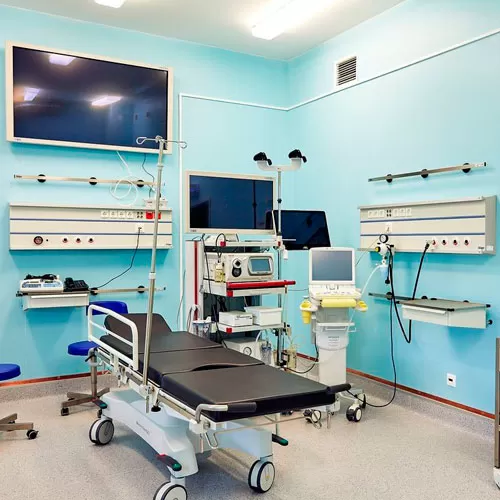
Today, endoscopy is one of the most clinically informative technique of digestive tract pathology diagnostics which allows to both perform a visualization, obtain biomaterial for histology and cytology tests and perform necessary manipulations. To perform an endoscopic examination, we use advanced expert-level equipment. Procedures are carried out by highly skilled medical staff.
ENDOSCOPIC EXAMINATION CAPABILITIES OF THE RCHCC
The Republican Clinical Medical Center performs the following endoscopic examinations:
- Bronchi examinations (bronchoscopy).. This is a procedure essential for the diagnosis of inflammatory processes in the bronchial tree, benign neoplasms and oncopathology of bronchis and trachea. During the examination, biopsy may also be performed if necessary (samples are collected for cytological studies).
- Examination of esophagus, stomach and the duodenum (esophagogastroduodenoscopy, EGDS)The examination is performed to diagnose various inflammatory diseases, erosion and ulcerative lesions, reveal benign neoplasms and cancroid diseases of esophagus, stomach and the duodenum. Therapeutic manipulations and biopsy may be carried out concurrently, they include the detection of Helicobacter pylory infection.
- Examination of the colon -- colonoscopy. . Using advanced equipment, we perform examination of the mucosal lining of colon and terminal ileum to reveal disorders and neoplasms. If it is necessary, biopsy and polyp removal may also be performed.
- Examination of bile and pancreatic ducts -- endoscopic retrograde cholangiopancreatography (ERCP) The technique is used to diagnose pathologies of bile-excreting ducts and pancreatic ducts. The most common indication to this examination is diagnostic of the causes and endoscopic therapy of obstructive jaundice.
- Examination of small gut -- enteroscopy. This is performed in the inpatient facilities to reveal abnormal changes, benign and malignant neoplasms and sources of bleeding in the small gut. If it is necessary, small gut neoplasms are removed and bleeding control is carried out.
- Endoscopic ultrasonography of digestive tract organs -- endoultrasonography.. . The procedure is used to diagnose submucosal mass of the digestive tract, pathologies of the pancreatobiliary area, as well as to determine the extent of digestive tract tumor expansion. If required, thin-needle puncture of the digestive tract and pancreatic gland neoplasms is performed with the assistance of endoscopic ultrasound imaging.
- Removal of benign digestive tract neoplasms. . We perform removal of polyps using various techniques. The specific procedure is selected individually in each case.
Endoscopic examinations may be performed both at the inpatient facilities and on outpatients, in accordance with examination and therapy programs.
If required, it is possible to apply general anesthesia. The patient will be observed during the procedure and for two hours after its completion by an anesthesiologist/intensive therapy physician.




